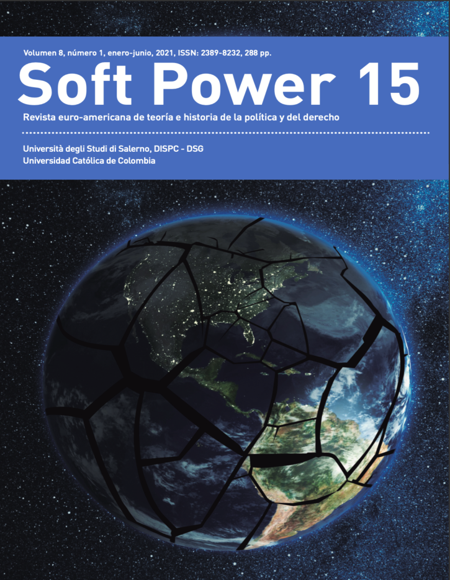
Esta obra está bajo una licencia internacional Creative Commons Atribución-NoComercial 4.0.
Al enviar los artículos para su evaluación, los autores aceptan que transfieren los derechos de publicación a Soft Power. Revista Soft Power para su publicación en cualquier medio. Con el fin de aumentar su visibilidad, los documentos se envían a bases de datos y sistemas de indización, así mismo pueden ser consultados en la página web de la Revista.Resumen
El modelo tradicional de análisis de la vulnerabilidad la relaciona con el dato antropológico y con la necesidad, para el hombre, de vivir bajo el paraguas protector de las instituciones. El ensayo trata de identificar, desde otra perspectiva, e parte institutionis, los efectos perversos y anómicos del desencadenamiento incontrolado de miedos, hostilidades y alteraciones del significado de conceptos como «pueblo» y «soberanía», que no pueden reducirse a visiones simplistas y unilaterales.
Palabras clave

Citas
Alfieri, L. (2021). L’ombra della sovranità. Roma: Treccani.
Bauman, Z. (2006). Liquid Fear. Cambridge: Polity.
Bodei, R. (2019). Dominio e sottomissione. Schiavi, animali, macchine, Intelligenza Artificiale.
Bologna: Il Mulino.
Burckhardt, J. (1950). Reflections on History. London: George Allen & Unwin Ltd.
Cassirer, E. (1958). Storia della filosofia moderna, IV. Torino: Einaudi.
Derrida, J. (1992). Force of Law: the ‘Mystical Foundation of Authorithy’. In D. Cornell,
M. Rosenfeld, & D.G. Carlson (Eds.), Deconstruction and Possibility of Justice. New
York and London: Routledge.
De Ruggiero, G. (2018). Il ritorno alla ragione. Soveria Mannelli: Rubbettino.
Esposito, R. (2021). Istituzione. Bologna: Il Mulino.
Ferrero, G. (1942). Pouvoir. Les génies invisibles de la cité. New York: Brentano.
Ginzburg, C. (2015). Paura, reverenza, terrore. Milano: Adelphi.
Girard, R. (2010). Battling to the End. East Lansing: Michigan State University Press.
Hart, H.L.A. (1994). The Concept of Law. Oxford and New York: Oxford University
Press.
Hobbes, T. (1998). Leviathan. Oxford and New York: Oxford University Press.
Jonas, H. (1985). The Imperative of Resposibility. Chicago and London: The University
of Chicago Press.
Löwith, K. (1949). Meaning in History. Chicago and London: The University of Chicago
Press.
Mancuso, F. (2013). Le verità del diritto. Pluralismo dei valori e legittimità. Torino: Giappichelli.
Mancuso, F. (2019). Il doppio volto del diritto. Torino: Giappichelli.
Nietzsche, F. (1986). Human, all too Human. Cambridge and New York: Cambridge
University Press.
Pastore, B. (2021). Semantica della vulnerabilità, soggetto, cultura giuridica. Torino:
Giappichelli.
Popitz, H. (2017). Phenomena of Power. New York: Columbia University Press.
Portinaro, P. P. (2005). Stato: un tentativo di riabilitazione, in Guaraldo O.-Tedoldi L., Lo
stato dello Stato. Verona: ombre corte.
Schmitt, C. (1996). The Leviathan in the State Theory of Thomas Hobbes. Westport and
London: Greenwood Press.
Snyder, T. (2019).The Road to Unfreedom: Russia, Europe, America, London: Vintage.
Sofsky, W. (1998). Saggio sulla violenza. Torino: Einaudi.
Zolo, D. (2011). Sulla paura. Milano: Feltrinelli.










